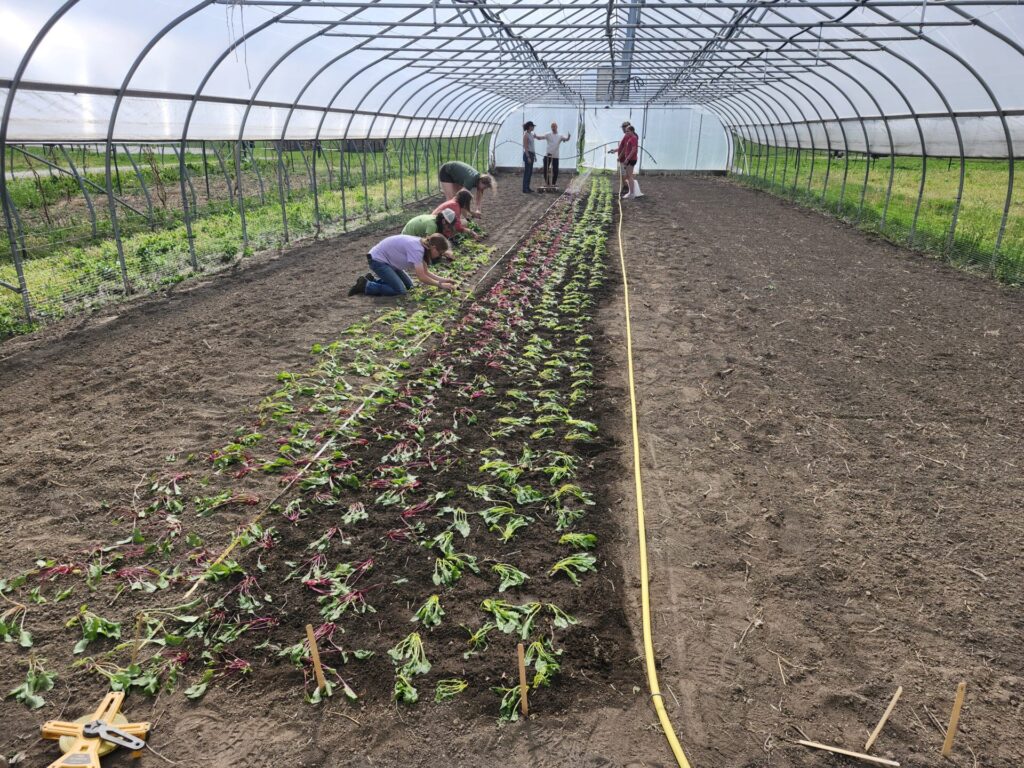What began in 2010 as a modest student initiative in a field of honeysuckle has blossomed into one of the country’s most dynamic educational farms. Today, the Purdue Student Farm operates on 3.5 acres on the northern edge of campus, serving as a living example of how a land-grant institution can integrate teaching, research, and Extension to serve students and community alike.
A Simple Yet Powerful Philosophy
The Purdue Student Farm’s approach is elegantly straightforward: we operate as a viable, diverse Indiana vegetable farm, and in doing so, we naturally create opportunities for education, outreach, and research. Growing nutrient-dense vegetables and herbs using principles that govern balanced ecosystems, we emphasize sustainable farming methods while addressing the three pillars of sustainability—economy, community, and environment.
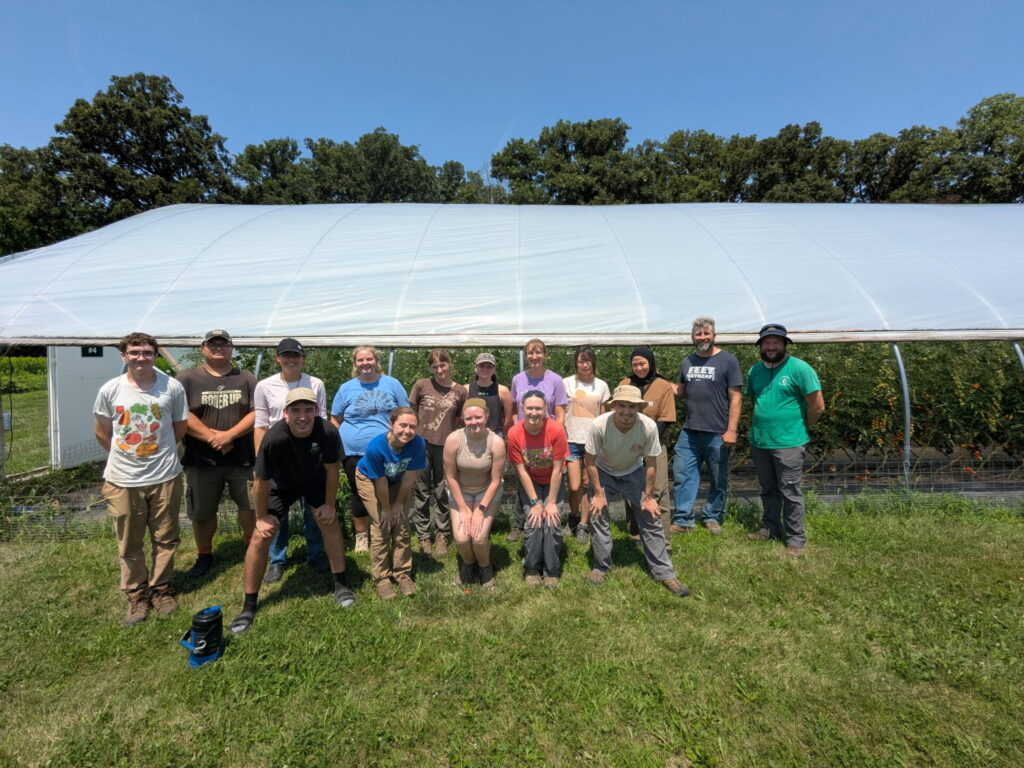
Figure 1. The Purdue Student Farm summer internship program offers students the opportunity to learn about the operation of a small farm, participating in all activities from seed to market (Photo by Chris Adair).
The farm truly integrates all three pillars of the College of Agriculture’s mission. We focus first on students, developing their skills in small farm management, vegetable production, and marketing. Second, we serve farm operators and consumers through Extension activities that support citizens across Indiana, the Midwest, and beyond. Third, we serve as a vital hub for on-farm research.
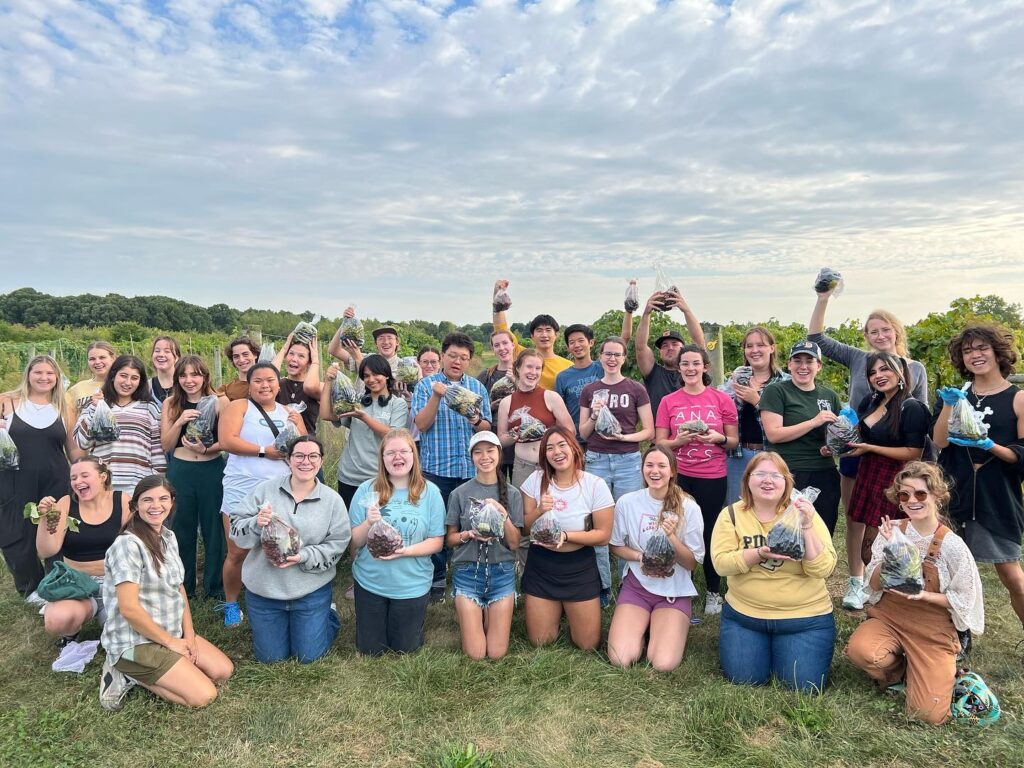
Figure 2. Purdue Student Farm Organization (PSFO) students were helping Miranda Purcell to harvest grapes at The Meigs Horticulture Facility (Photo by PSFO member).
Impact by the Numbers
The farm’s 2024 achievements tell a compelling story of productivity and educational reach:
Production and Community Impact:
- 27,295 pounds of high-quality food produced
- 25,595 pounds sold through various channels
- 19,104 pounds from the Purdue Student Farm
- 6,491 from Meigs/Throckmorton Purdue Ag Center
- 25,595 pounds sold through various channels
- 1,700 pounds donated to support local food security initiatives
Educational Outreach:
- 6,400 hours dedicated to education
- 627 students, farm operators, and visitors engaged
- 131 students and 54 farm operators trained in sustainable farming practices
Research Excellence:
- 12 investigators from multiple colleges conducted 17 on-farm projects
- 7 graduate students supported (2 PhD, 5 MS)
- 47 publications and presentations disseminated
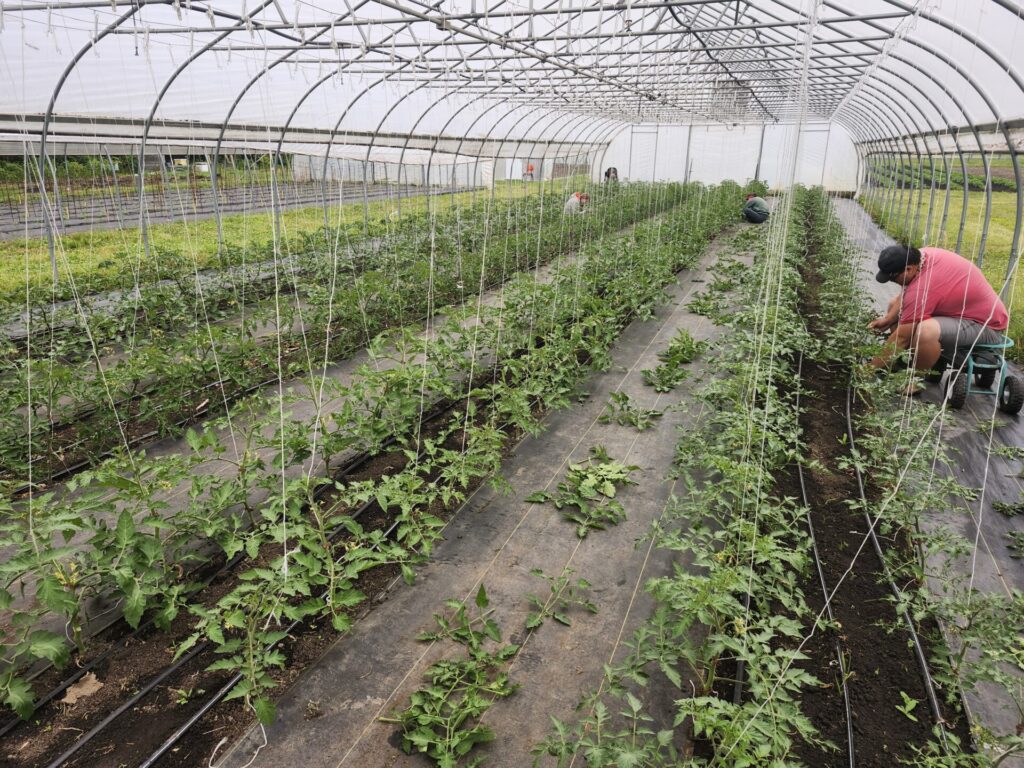
Figure 4. A student prunes and trellises tomatoes in a high tunnel at the Purdue Student Farm (Photo by Chris Adair).
Innovation in Research and Technology
Research conducted at the farm spans diverse agricultural challenges. Faculty and students have developed video analytics systems for assessing hand-hygiene practices in wash-pack environments and created HortCalculator, an online financial planning tool that has reached 7,000 stakeholders with a remarkable 95% adoption rate. Mobile device LiDAR technology for non-destructive plant assessment has also been tested on-site.
One standout achievement is our pioneering integrated weed management program, which achieved a 60% reduction in hand-weeding labor costs while simultaneously improving yield. Our research on leaf mold compost earned an Outstanding Paper Award in Urban Agriculture and Regional Food Systems, and our pepper variety trials have reached growers in 108 countries.
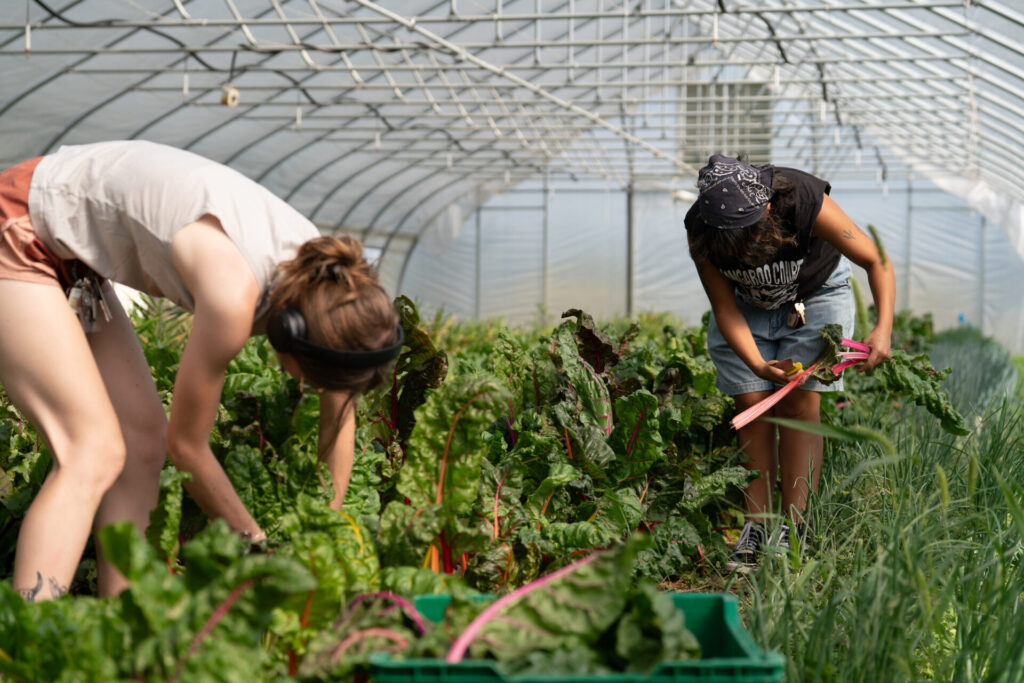
Figure 5. Students in a Small Farms Experience course (SFS 21000) help with harvesting Swiss chard at the Purdue Student Farm (Photo by Joshua Clark).
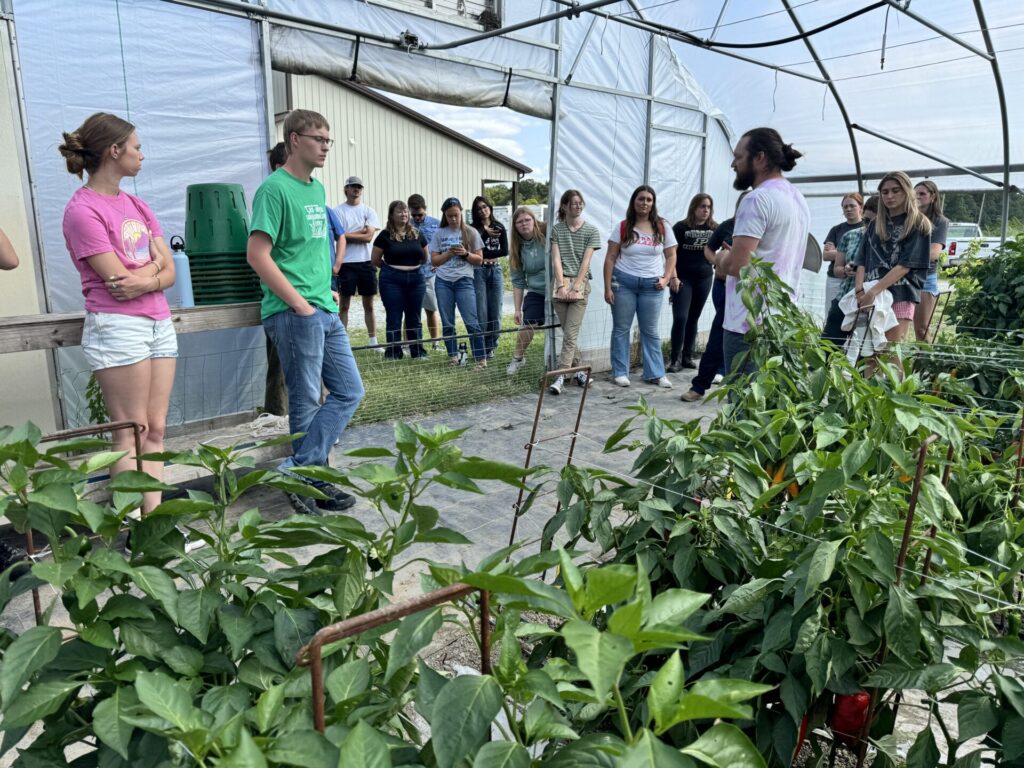
Figure 6. The HORT 318 (Field Production of Horticulture Crops) class is listening to Chris Adair (Purdue Student Farm manager) describing how we cultivate sweet peppers in a high tunnel (Photo by Petrus Langenhoven).
The Overbeck Controlled Environment Agriculture Facility
A major advancement was made with the addition of the Overbeck Controlled Environment Agriculture Facility—two state-of-the-art container farms bringing vertical farming technology to campus. In just its first year of operation, the facility has produced impressive results:
- Over 2,100 pounds of head lettuce (approximately 10,000 heads)
- Substantial quantities of mixed greens and herbs
- Year-round production regardless of Indiana’s seasonal limitations
Six student interns rotate through the facility weekly, gaining hands-on experience with advanced agricultural technology. As one student noted, “This opportunity is allowing me to see similar technologies to the ones used in the production of plants in space right here on Purdue’s campus, all while producing fresh produce for the local West Lafayette community.”
The facility has enabled the launch of a new Spring Salad Kit CSA program and supplies campus culinary programs with fresh greens throughout the year.
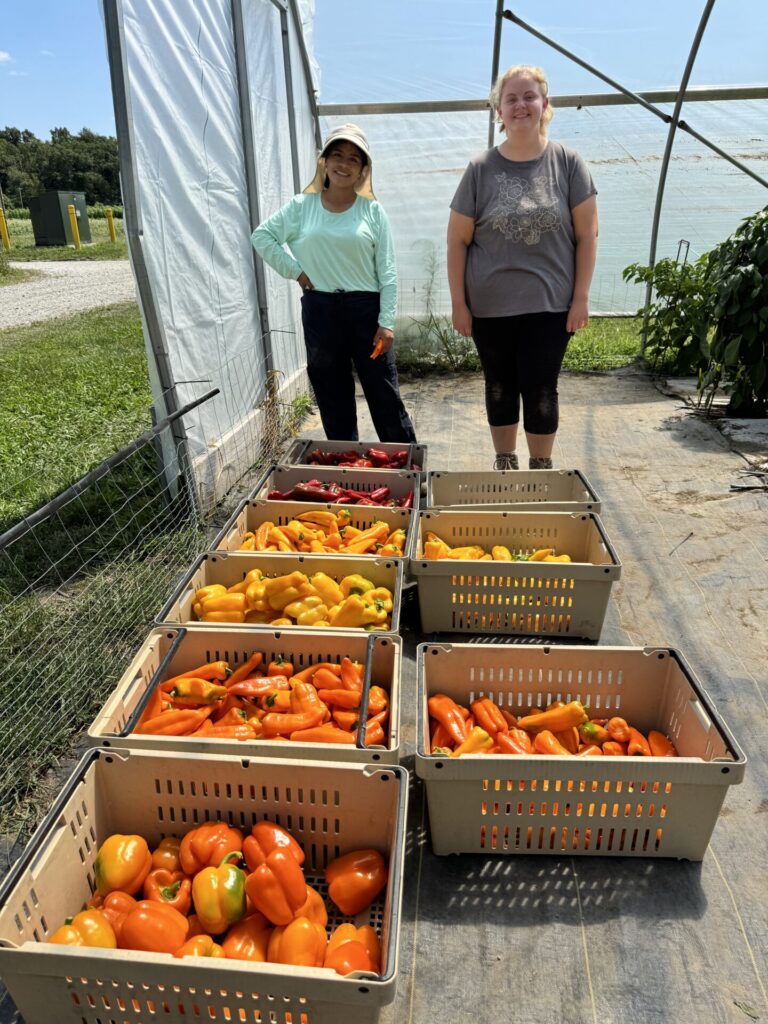
Figure 7. Students helping with the harvesting of a high tunnel sweet pepper variety trial at the Purdue Student Farm (Photo by Petrus Langenhoven).
Community Supported Agriculture: From Challenge to Success
When COVID-19 closed campus dining courts in 2020, the Purdue Student Farm faced a critical moment. Rather than shutting down, the team pivoted and launched the Boilermaker Vegetable Season Pass CSA program. What started with 50 members has grown to 153 today.
Members consistently rate the program as “world-class” and strongly support its local, student-led, and educational mission. The feedback speaks for itself. One member shared, “I so look forward to the vegetable bag each Friday as I start my meal prep for the weekend, making great food from fresh ingredients.” A graduate student noted that the program “removed all of the decision fatigue around shopping for veggies and ensured she was eating healthy.”
By purchasing a CSA share, community members directly support student education while receiving fresh, locally grown vegetables—they’re investing in the next generation of agricultural leaders.
Annual Small Farm Education Field Day
Since 2018, the Annual Small Farm Education Field Day has become a cornerstone event for Indiana’s growing community of small and medium-sized farmers seeking practical knowledge in sustainable agriculture. The event has attracted over 900 participants throughout its history.
This signature program exemplifies what the Purdue Student Farm does best: bringing together academic expertise and practical farming experience. Fifteen faculty members, specialists, Extension educators, and students coordinate demonstrations throughout the year, offering hands-on guidance in diverse farming practices. The Field Day has become a vital hub for knowledge transfer, helping Indiana’s farmers adopt sustainable practices and enhance their operations.
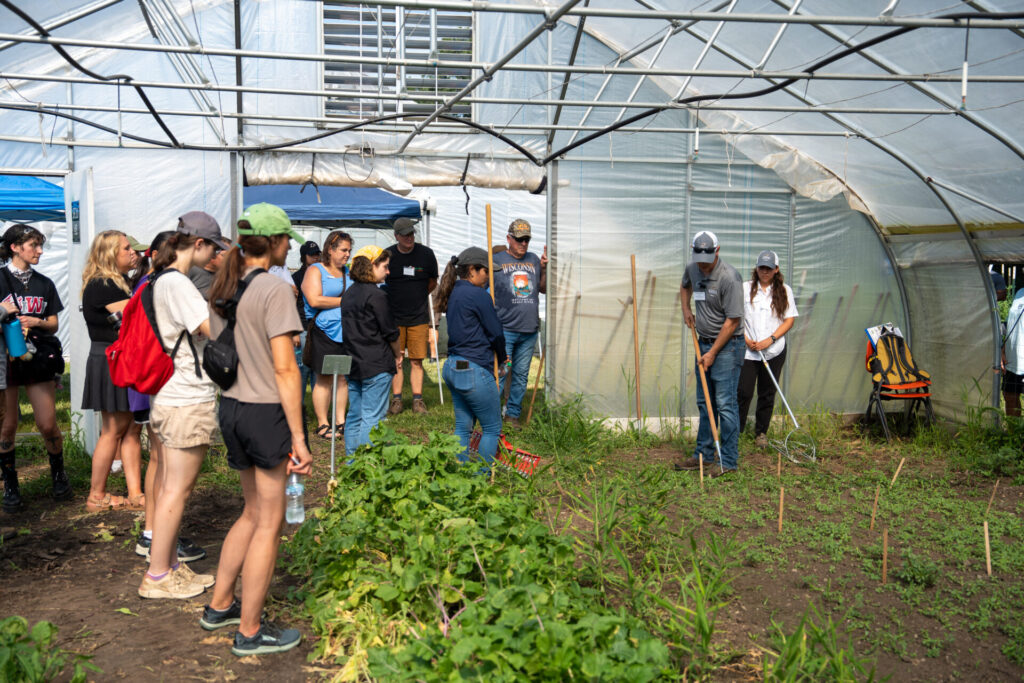
Figure 8. The Purdue Student Farm hosts the annual Small Farm Education Field Day during the third week of July. Here, Stephen Meyers and graduate students Jeanine Arana and Celia Corado demonstrate different hand-weeding tools to attendees (Photo by Joshua Clark).
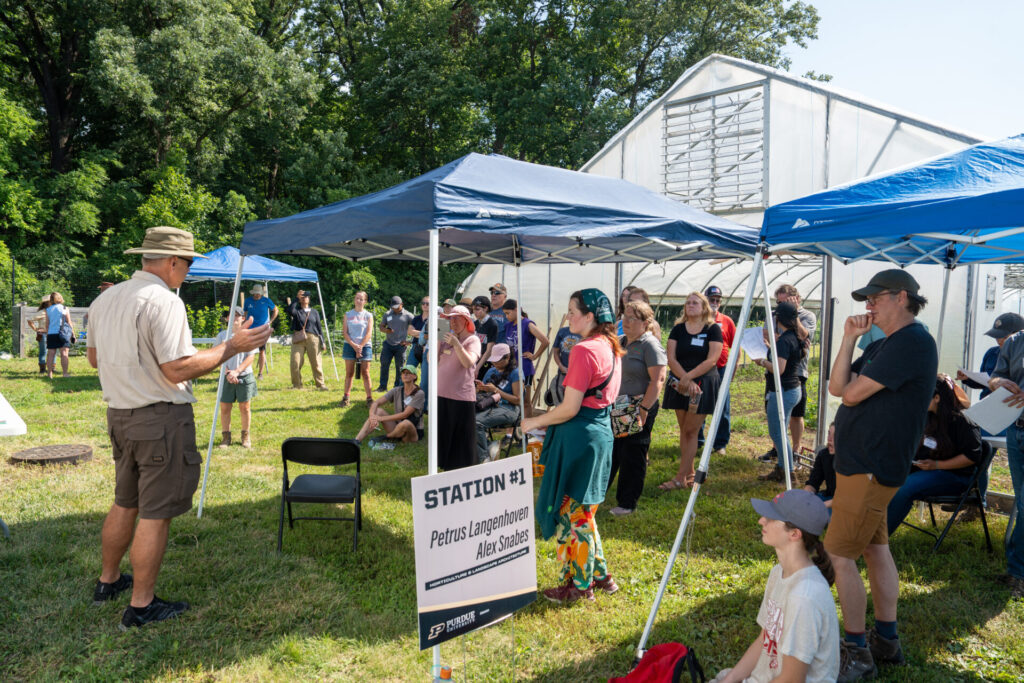
Figure 9. Petrus Langenhoven is talking to attendees about pepper cultivation in high tunnels at the Small Farm Education Field Day (Photo by Joshua Clark).
Building Bridges and Growing Community
What makes the Purdue Student Farm special extends beyond production numbers and research output. The farm has created partnerships with Purdue Cultural Centers, hosted international visitors from Peru, Ukraine, Japan, and Hawaii, and welcomed groups from NRCS, USDA, and FFA chapters. The Student Farm co-leads study abroad experiences and maintains a commitment to community service through regular donations to ACE Food Pantry, Food Finders Food Bank, and Purdue Cultural Centers.
From outdoor fields to cutting-edge vertical farms, the Purdue Student Farm has created a comprehensive learning environment that prepares students for every aspect of modern agriculture. It embodies a fundamental aspect of the land-grant mission: a place where teaching, research, and Extension come together in service to students and the community.
The Purdue Student Farm isn’t just growing vegetables—it’s growing future agricultural leaders, advancing sustainable farming knowledge, and nourishing the community in every sense of the word. Come and visit us anytime!
For more information about the Purdue Student Farm, visit ag.purdue.edu/department/hla/facilities/student-farm or contact Petrus Langenhoven (Purdue Student Farm director) or Chris Adair (Purdue Student Farm Manager) at the Department of Horticulture and Landscape Architecture, studentfarm@purdue.edu.
